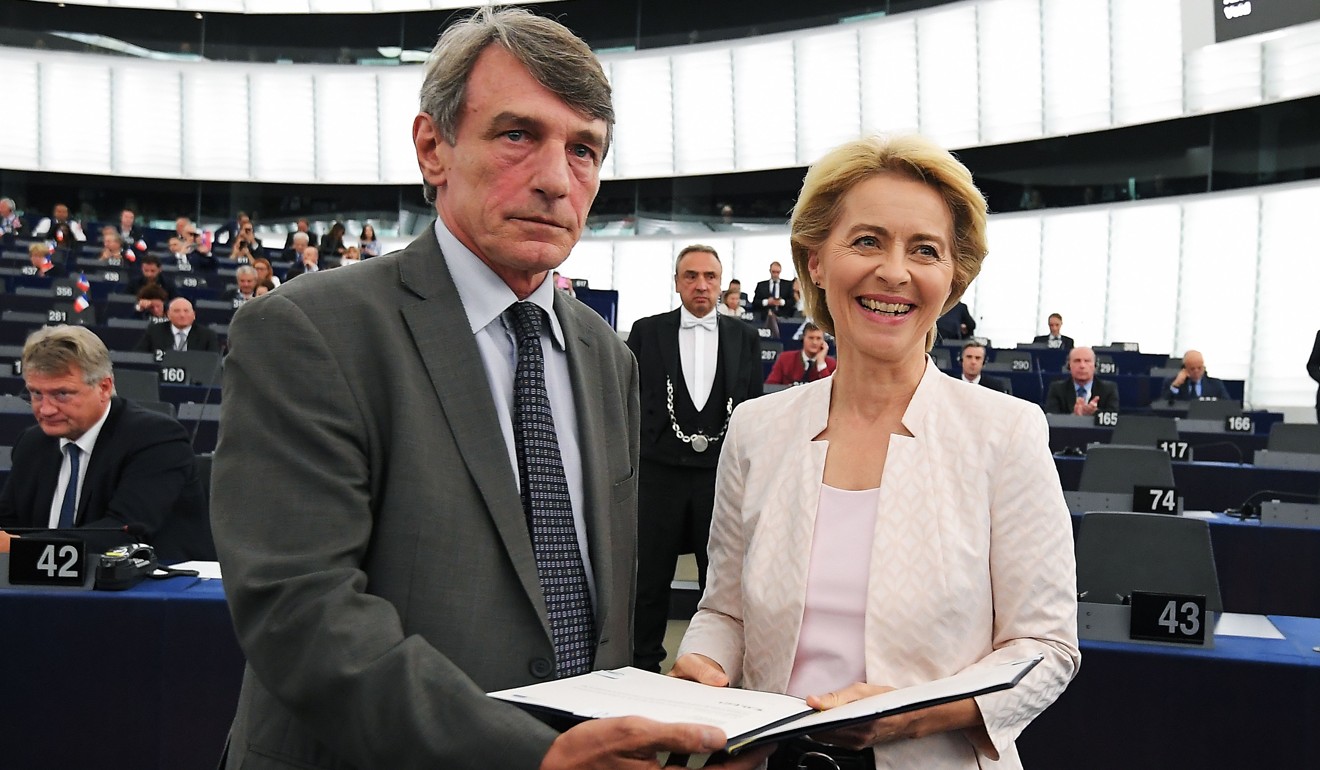
New EU chief Ursula von der Leyen vows to uphold the rules-based order ‘the European way’
- Victory ushers the hawkish ally of German Chancellor Angela Merkel onto a path of potentially more challenging EU-China relations.
- First-ever female head of the European Commission says ‘we want fair trade’
In her speech, the ally of German Chancellor Angela Merkel vowed to uphold a rules-based order “the European way”.
“We want multilateralism, we want fair trade, we defend the rules-based order because we know it is better for all of us,” Von der Leyen said following her selection in Brussels. “We have to do it the European way.”
Analysts say the EU could be tempted to take a harder line on China’s growing influence over the geopolitical and business environments in Europe.

The European Union privately has been accusing China of splitting the bloc and the continent, prompting Chinese officials to repeatedly reassure the EU that China will stand by its vow to respect European unity.
China’s plan for a 5G technology business in Europe – coupled with the promotion of Belt and Road Initiative projects in the poorer part of the EU – have fuelled suspicion in Brussels, too.
The belt and road is China’s massive plan to link the country with Asia, Europe and Africa through a network of infrastructure projects.
As head of the EU executive, Von der Leyen will be in charge of trade negotiations, economic and climate policy for 500 million Europeans and antitrust rulings involving powerful tech giants.
She won the vote by a 383-327 count, the speaker of the assembly, David Sassoli, announced. She cleared the minimum threshold of 374 by only nine votes and was far short of the 422 votes cast in favour of Juncker in 2014.
“The trust you placed in me is confidence you placed in Europe,” the German Christian Democrat said. “Your confidence in a united and strong Europe, from east to west, from south to north. It’s a big responsibility and my work starts now.”
On Tuesday, she did not say much about her views on China and Russia, which she had cast as major threats facing Europe.
New EU leaders need to lay out visions for unity and growth
As German defence minister, Von der Leyen had said earlier this year that China “kindly ensnares” Europe.
“We often overlook how consistently it pursues its goals – and how cleverly,” she said.
As the first German to lead the commission in half a century, Von der Leyen focused her pre-vote address Tuesday on climate change, pledging to make Europe by 2050 the first “carbon neutral” continent – meaning it could reduce carbon emissions while offsetting the its remaining carbon emissions with climate protection policies.
She also vowed to achieve gender equality among the commissioners’ positions, saying that she was prepared to “ask for new names” if member states failed to come up with a sufficient list of women to choose from.
Besides vowing to defend the rule of law, Von der Leyen took aim at US tech giants’ low tax bills in Europe and said she would update EU-wide policies for tackling the European migrant crisis.
“We need to address the legitimate concerns of many and look at how we can overcome our differences,” she said.
German nominee for top EU job could be tough on China
Von der Leyen also indirectly took aim at foreign powers’ attempt to split Europe, vowing that Europe under her leadership would provide clear, centralised foreign policy decisions.
“I believe Europe should have a stronger and more united voice in the world – and it needs to act fast,” she said.
“That is why we must have the courage to [make] foreign policy decisions by qualified majority. And to stand united behind them.”
“Trump has created a vacuum in global governance, and this is something that the EU and China will definitely work together to fill and rebuild,” Ding said, adding that the EU and China would work together on security issues like Iran, and on climate change, which figured heavily in Von der Leyen’s speech on Tuesday.
“I am still a bit cautious. She does, by comparison, represent the thinking of the more centre-right, or Germany,” he said.
“But because she won by a narrow margin, she will have to balance that with other interests, like those of the Greens and Social Democrats, or even the far right. So we can be cautiously optimistic that she will represent the collective, compromised voice of a body as large and diverse as the EU.”
Jiang Shixue, a professor of European studies at the Chinese Academy of Social Sciences, said that although Von der Leyen’s past comments on China had at times been critical, she would probably use warmer language as the commission’s president, especially in light of growing economic ties.
Jiang said that Von der Leyen, without a strong background in economics, could be expected to rely closely on her advisers, who were likely to have a more “positive attitude” towards China.


